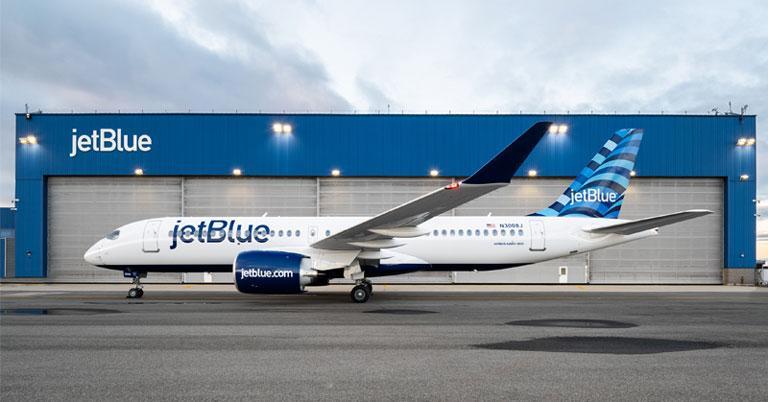
JetBlue has announced plans to speed up its transition to sustainable aviation fuel (SAF) with an offtake agreement with SG Preston, a leading bioenergy developer.
With the addition of the agreement to its previous SAF commitments, JetBlue says that it is now ahead of its target to convert 10% of its total fuel usage to SAF on a blended basis by 2030.
The new agreement will see the carrier reach 8% SAF usage by the end of 2023, when the delivery of SAF is expected.
JetBlue is doubling its previous SAF commitment with SG Preston, which was first announced in 2016 as one of the largest SAF purchase agreements in aviation history.
The deal is also expected to bring the first large-scale volume of domestically produced SAF for a commercial airline to New York’s metropolitan airports. JetBlue will convert 30% of its fuel buy across John F. Kennedy International Airport (JFK), LaGuardia Airport (LGA) and Newark Liberty International Airport (EWR) from traditional Jet-A fuel to SAF, which is expected to reduce emissions by an estimated 80% per gallon of neat SAF, compared to traditional petroleum-based fuels.
Targeting a start in 2023 and continuing over a 10-year period, SG Preston will deliver at least 670 million gallons of blended SAF to JetBlue to fuel its flight operations at JFK, LGA and EWR.
This is expected to help JetBlue avoid approximately 1.5 million metric tons of CO2 emissions. JetBlue also hopes to invest more than $1 billion in purchasing SAF over the term of this agreement, at a price competitive to traditional Jet-A fuel, with no expected material impact to the airline’s total fuel costs.
This marks the largest-ever announced near-term SAF deal for delivery in the Northeast and will be become the airline’s largest single jet fuel contract.
“We are well past the point of vague climate commitments and corporate strategies. Earlier this year, we set specific, dated, and aggressive emissions targets. And now we are physically changing the fuel in our aircraft to meet these commitments,” said Robin Hayes, Chief Executive Officer, JetBlue. “At JetBlue, we’re heavily investing in SAF because we see it as our most promising means of rapidly and directly reducing aircraft emissions in the near-term. With this expanded agreement with SG Preston, nearly eight percent of JetBlue’s total fuel use will be SAF, putting us well ahead of pace in reaching our goal of 10 percent SAF usage by 2030.”
Sustainable aviation fuel is jet fuel produced from biological resources that can be replenished rapidly and without impacting food supply. Compared to traditional petroleum-based Jet-A fuel, renewable options can significantly reduce both greenhouse gas emissions and other air pollutants such as particulate matter and sulfur oxides.
The fuel is fully compatible with existing jet engine technology and fuel distribution infrastructure when blended with fossil jet fuel, and is tested and transported the same way as regular Jet-A fuel.
Randy Delbert Letang, CEO of SG Preston, commented: “The SG Preston-JetBlue relationship is the blueprint for a balanced partnership designed to achieve both the airline’s and global aviation’s sustainability and pricing goals. The reality of achieving the US sustainability target of approximately 35 billion gallons of sustainable aviation fuel by 2050 is daunting. Engaging with, and addressing the concerns of all key stakeholders and contributors to the solution, is paramount to successfully reaching this target. JetBlue’s continued commitment to SG Preston’s development strategy illustrates continued confidence in our unique approach to this challenge. We’re honored by this demonstration of trust.”






